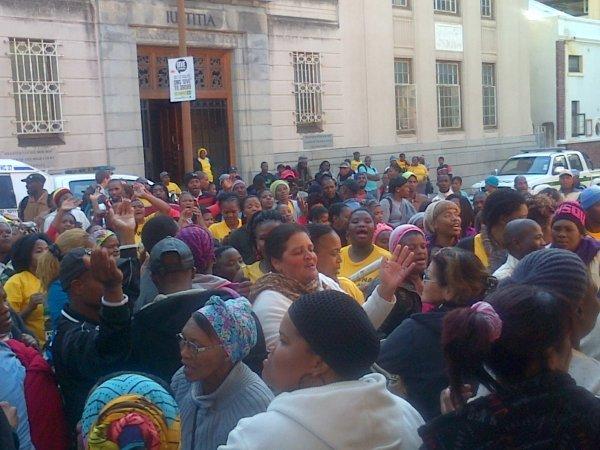

Ses’khona members waited for hours outside the Cape Town Magistrate’s Court today for the ruling on seven leaders. Photo by Pharie Sefali.
11 July 2014
Judgment will be delivered on 18 July in the case of Andile Lili and six others charged after the “poo protests” in the city in June 2013.
The state argued that on 10 June 2013, 186 Ses’khona members illegally boarded a train at Chris Hani station to Cape Town station, with seven “pota-pota” portable toilets and plastic bags containing human waste.
The Ses’khona members were all in one train carriage, singing and dancing on their way to town to dump the human waste at the provincial offices.
The state argued that it was unlawful for Ses’khona to bring human waste onto the train since it is a public space and only trained people are meant to carry human waste.
The state said the Ses’khona members had not acted out of necessity.
The group were stopped by police at Ysterplaat station, one station before Cape Town Station.
The state argued that the gathering was organised and that Lili was the leader.The seven accused were carrying the “pota pota” toilets.
Ses’khona lawyer Duncan Korabie said the accused were not guilty of any offence and the City of Cape Town should be charged.
Quoting Nelson Mandela that to deny people their human rights is to challenge their humanity, he said the accused had in fact acted out of necessity, because of the conditions they lived under in their communities.
“The human waste in their communities was not collected for more than six months due to the fact that the people employed by the City to collect the waste, Sanicare, were on strike”.
“People lived in filthy conditions and that could have caused deadly water diseases if the community did not do anything about it”, he said.
Korabie said the city should have found a solution since it was the city’s responsibility to collect the waste. A basic sanitation service was the community’s right, he said.
Korabie said the accused had intended to dump the waste in the toilets of the provincial government. They had carried it in blue bags provided by the City and in “pota-potas” provided by the City.
Ses’khona wanted to bring the toilets to Premier Helen Zille, to ask for help, he said.
Judgment was reserved.